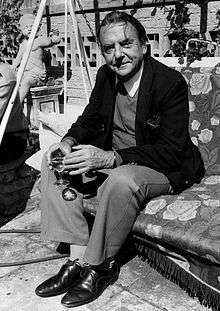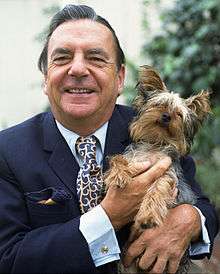Robin Maugham

Robert Cecil Romer Maugham, 2nd Viscount Maugham (17 May 1916 – 13 March 1981), known as Robin Maugham, was a British author.
Trained as a barrister, he served with distinction in World War II, and wrote a successful novella, The Servant, later filmed with Dirk Bogarde and James Fox. This was followed by over thirty books including novels, travelogues, plays and biographical works. In the House of Lords, he drew attention to human trafficking as the new slavery.
Family background
Robin Maugham was the son of Frederic Maugham, 1st Viscount Maugham, and Helen Romer. Educated at Eton College and Trinity Hall, Cambridge, he was expected to follow his father and grandfather into the law. But although he qualified as a barrister, he realised that his real calling was to follow his uncle W. Somerset Maugham as a writer. He also responded against his elite background, turning socialist as a reaction to the spread of fascism in 1930s Europe.
War service
When the Second World War looked inevitable, he declined a commission in the Hussars and instead joined up as an ordinary trooper in the 4th County of London Yeomanry tank regiment bound for North Africa. Later, his commanding officer Brigadier Carr recorded in dispatches that Robin Maugham had saved the lives of perhaps 40 men by pulling them from destroyed tanks. At the Battle of Knightsbridge he sustained a severe head wound that resulted in blackouts, which he later joked made him perfect material for a job in intelligence.
After a period of convalescence he became the unofficial liaison officer between Winston Churchill and both Glubb Pasha and General Paget. He describes in his first travel book Nomad (Chapman & Hall 1947) how he dashed across the Levant from one bemedaled dignitary to another. His maverick style proved an effective driving force behind the setting up of the Middle East Centre of Arabic Studies (MECAS), corroborated in Leslie McLoughin’s history of British Arabists in the 20th century In a Sea of Knowledge (Ithica Press 2002). MECAS had a profound effect on diplomatic relations in the Middle East for decades to come. Frustrated by governmental delays, and in a state of exhaustion, he was invalided back to England.
Literary career
Disillusioned by politics, he turned his mind to writing. His first professional dramatic work appeared at the Chanticleer Theatre in South Kensington (1944). This was followed by a novel, Come to Dust (Chapman & Hall 1945), written in a hospital bed as a cathartic release from the traumas of war. His first major success came with the publication of a novella entitled The Servant (Falcon Press 1948), on which was based the classic film with Dirk Bogarde and James Fox.
After his father died in 1958, he took the title of 2nd Viscount Maugham. His maiden speech in the House of Lords on slavery alerted the world to the continued existence of human trafficking. From this came his book The Slaves of Timbuktu (Longmans 1961). At the height of his powers, Robin Maugham had been a best-selling author with his novels translated into many languages. He wrote over thirty books including novels, travel books, plays, and biographical works such as Somerset and all the Maughams (Heinemann 1966).
Death
However, in the last five years of his life, with the impact of the new movement of working class realism, his popularity began to diminish and his health deteriorated. Robin Maugham died in Brighton in 1981, aged 64.

Sexuality
Described as "defiantly homosexual", but in fact bisexual, Lord Maugham never married, and the viscountcy became extinct upon his death. He died from a pulmonary embolism, compounded by long-standing diabetes mellitus,[1] though an official cause of death was difficult to obtain as his body was apparently lost for forty-eight hours after his death. He had three sisters: Kate, Honor, and novelist Diana Marr-Johnson (1908–2007). He is buried in Hartfield, Sussex, next to his parents.
Maugham bought the merchant ship MV Joyita as a hulk in the early 1960s, writing about the mystery of the incident in his book The Joyita Mystery (1962). The ship had been lost at sea only to reappear five weeks later after a massive search found nothing, without crew or passengers, and with four tons of cargo missing. He wrote a candid, critically acclaimed, autobiography, Escape from the Shadows (London: Hodder and Stoughton, 1972), and then a sequel, Search for Nirvana (1975).
Films
Three of his novels and a short story were filmed: The Servant by Joseph Losey with Dirk Bogarde and James Fox; Line on Ginger retitled: "The Intruder" by Guy Hamilton 1953, with Jack Hawkins and George Cole; The Rough and the Smooth by Robert Siodmak 1959, with Tony Britton and William Bendix; the short story, "The Black Tent" (1956 film by Brian Desmond Hurst).
Works
Novels
|
|
|
Biography and travel
|
|
|
Plays, speeches, television and radio
- 1955: The Leopard (play) set in Tanganyika. Connaught Theatre, Worthing
- 1956: Mister Lear (play) Connaught Theatre, Worthing
- 1957: Rise Above It (Television) Produced by ABC. BBC Productions
- 1957: Odd Man In (play) Adaptation of Claude Magnier’s comedy Monsieur Masure. St Martin’s Theatre
- 1957: The Last Hero (play) Repertory Players, Strand Theatre, London. The subject was the life of General Gordon
- 1957: The Lonesome Road (Play) by Robin Maugham and Philip King. Arts Theatre, London, (1957)
- 1957: Winter in Ischia (Play) (not yet performed), see also 1965
- 1958: The Servant (play) Adaptation by Robin Maugham. Connaught Theatre, Worthing
- 1960: Slavery in Africa and Arabia (The House of Lords publication of his maiden speech; Hansard)
- 1960: The Two Wise Virgins of Hove (ITV Television)
- 1961: The Claimant (play) Connaught Theatre, Worthing
- 1962: Azouk (play) Adaptation of Alexandre Rivermale’s play by Robin Maugham and Willis Hall. The Flora Robson Playhouse, Newcastle upon Tyne
- 1962: The Last Hero (radio play) based on the life of General Gordon. Produced for BBC Radio, Saturday Night Theatre
- 1965: Winter in Ischia (television ITV), see also 1957
- 1966: Gordon of Khartoum (Play of the Month, BBC1)
- 1966: The Servant (play) The Yvonne Arnaud Theatre, Guildford
- 1969: Enemy (play) Premiere, The Yvonne Arnaud Theatre Guildford
- 1969: Enemy (play) Saville Theatre, London
- 1981: A Question of Retreat (play) Nightingale Theatre, Brighton; also adapted for a Radio 4, BBC production
References
Sources
- "Robin Maugham: An Inventory of His Collection at the Harry Ransom Humanities Research Center". The University of Texas at Austin. Retrieved 10 October 2011.
- Connon, Bryan (1997) Somerset Maugham and the Maugham Dynasty. London: Sinclair-Stevenson; ISBN 1-85619-274-1
- da Silva, Stephen (12 July 2005). "Maugham, Robin (1916-1981)". glbtq.com. Retrieved 10 October 2011.
- McLoughin, Leslie: In a Sea of Knowledge - a history of British Arabists in the 20th century (Ithica Press 2002)
- Gay for Today
External links
| Wikiquote has quotations related to: Robin Maugham |
| Peerage of England | ||
|---|---|---|
| Preceded by Frederic Maugham |
Viscount Maugham 1958–1981 |
Extinct |